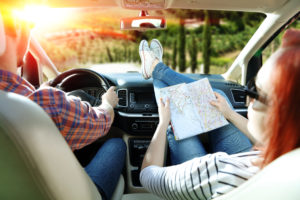
The data shows that while 10% of Americans don’t feel safe in any mode of transportation right now, 80% feel safe while in cars. In addition, nearly three in four Americans surveyed reported using their car as a mental health escape while in quarantine. The results also show that despite their differences, liberals and conservatives are aligned when it comes to using their cars for acts of kindness, such as delivering groceries to those in need and using money that would normally go toward gas to support small businesses in their local economy.
“While COVID-19 has made public transportation a non-starter for most Americans, an overwhelming majority of us are looking to our personal vehicles to provide safety and peace of mind during essential travel – and even to serve as escapes from the stresses of this moment,” said Georg Bauer, Fair’s Co-Founder and President. “While we all look forward to whatever ‘normal’ will look like post-pandemic, it’s clear that our cars will remain a staple of our American life for a long time to come.”
The Fair-sponsored survey also found that the pandemic has heightened Americans’ fears regarding public transportation. The survey results showed the following:
- Americans feel most apprehensive riding buses (55%) vs. other modes of transportation, such as rideshare/taxis (49%) and their cars (20%).
- Suburban Americans were the leeriest about using public transportation, with 60% saying they were afraid to ride trains/subways vs. 52% of urban dwellers and 51% of those in rural areas.
Along with helping people feel safer on their daily commutes and errand-running, more Americans are turning to their cars to be a personal safe haven. During the recent periods of sheltering at home:
- 30% of surveyed Americans said they used their car to take a mini-break by driving around their neighborhood.
- 24% reported taking a long drive to clear their head.
- 16% responded that they have sat in their car outside their house listening to music or audiobooks.
Americans may have different opinions about how the pandemic is being handled by government leaders, but they are united on the idea that cars can be a source of social good and service during this time. According to the survey:
- An equal share of self-identified Republicans and Democrats (21% of each group) used their cars to deliver groceries during the pandemic as an act of kindness to friends/family/neighbors in need.
- Democrats and Republicans were also equally likely (14% of each group) to use the money they saved on gas during the pandemic to support their local economies.
- There was less alignment regarding so-called “car parades,” with 27% of liberals reporting having participated in the drive-by celebrations during the pandemic vs. only 18% of conservatives.
According to the survey, Americans aren’t optimistic about the prospect of resuming their normal transportation habits – even into next year:
- Only 19% of people in the Western U.S. responded that they would return to their regular use of rideshare services in 2021 if proper safety measures were put in place vs. just 10% of Northeasterners. Among Southerners, 17% felt the same vs. just 12% of Midwesterners.
- By next year, 44% of people surveyed said they will still fear traveling on planes, while 39% said they plan to skip international travel altogether in 2021.
- Regionally, only 31% of people in the Western U.S. said they planned to travel outside the U.S. in 2021 vs. 42% in the Northeast and Midwest, and 44% in the South.
- In place of international travel, 35% of those surveyed said they would be down for a road trip instead.